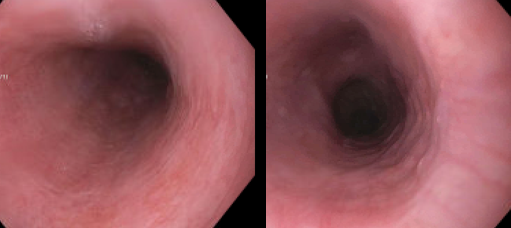Monday Poster Session
Category: Esophagus
P2847 - HSV Esophagitis Presenting as Intractable Hiccups in Immunosuppressed Patient: Diagnostic Challenges and Management Implications
Monday, October 27, 2025
10:30 AM - 4:00 PM PDT
Location: Exhibit Hall
- GP
Gayatri Pemmasani, MD
Henry Ford Health
Detroit, MI
Presenting Author(s)
Gayatri Pemmasani, MD1, Nimr Assaf, 2, Keith E. Mullins, MD1
1Henry Ford Health, Detroit, MI; 2Wayne State School of Medicine, Detroit, MI
Introduction: Herpes simplex virus (HSV) esophagitis remains a diagnostic dilemma in immunocompromised hosts, particularly when presenting with atypical manifestations. While only four prior cases in the literature associate HSV esophagitis with intractable hiccups, this presentation may delay diagnosis. We present a challenging case of biopsy-negative HSV esophagitis in a lung transplant recipient where clinical-endoscopic correlation proved vital for diagnosis and management.
Case Description/
Methods: A 64-year-old male with sarcoidosis s/p bilateral lung transplantation, stage 3b CKD, and GERD presented with 3 days of unrelenting hiccups. Initial evaluation revealed profound hyponatremia (Na 104 mEq/L) and hypocalcemia. Despite electrolyte correction, hiccups persisted and he developed dysphagia during this time. Barium esophagogram and swallowing studies were unrevealing. EGD demonstrated multiple white plaques proximally and LA Grade D distal erosive esophagitis, prompting acid suppression and empiric fluconazole therapy. Histopathology showed ulceration with inflammatory exudate but negative HSV immunostaining and no fungal elements. Esophageal brushings revealed multinucleated giant cells with viral inclusions, supporting HSV diagnosis despite negative staining. Symptoms improved with valacyclovir therapy. Repeat EGD at 5 weeks confirmed complete mucosal healing.
Discussion: This case illustrates several key points in managing HSV esophagitis. First, while intractable hiccups represent an uncommon presentation of HSV esophagitis, with only four prior cases reported, they may precede classic symptoms, serving as an important diagnostic clue in immunocompromised hosts. Second, the diagnostic challenges are compounded by the fact that up to 15% of HSV esophagitis cases may yield negative immunostaining, emphasizing the importance of utilizing multiple diagnostic modalities including careful histologic examination of brushings for viral cytopathic effects. This case represents the first reported instance of biopsy-negative HSV esophagitis presenting with isolated hiccups, reinforcing that immunocompromised hosts require aggressive diagnostic evaluation for atypical upper GI symptoms and that endoscopic correlation with histologic findings remains paramount. The complete resolution seen on follow-up endoscopy further validates our diagnostic approach and management decisions.

Figure: Initial endoscopic findings

Figure: Follow up upper endoscopy
Disclosures:
Gayatri Pemmasani indicated no relevant financial relationships.
Nimr Assaf indicated no relevant financial relationships.
Keith E. Mullins indicated no relevant financial relationships.
Gayatri Pemmasani, MD1, Nimr Assaf, 2, Keith E. Mullins, MD1. P2847 - HSV Esophagitis Presenting as Intractable Hiccups in Immunosuppressed Patient: Diagnostic Challenges and Management Implications, ACG 2025 Annual Scientific Meeting Abstracts. Phoenix, AZ: American College of Gastroenterology.
1Henry Ford Health, Detroit, MI; 2Wayne State School of Medicine, Detroit, MI
Introduction: Herpes simplex virus (HSV) esophagitis remains a diagnostic dilemma in immunocompromised hosts, particularly when presenting with atypical manifestations. While only four prior cases in the literature associate HSV esophagitis with intractable hiccups, this presentation may delay diagnosis. We present a challenging case of biopsy-negative HSV esophagitis in a lung transplant recipient where clinical-endoscopic correlation proved vital for diagnosis and management.
Case Description/
Methods: A 64-year-old male with sarcoidosis s/p bilateral lung transplantation, stage 3b CKD, and GERD presented with 3 days of unrelenting hiccups. Initial evaluation revealed profound hyponatremia (Na 104 mEq/L) and hypocalcemia. Despite electrolyte correction, hiccups persisted and he developed dysphagia during this time. Barium esophagogram and swallowing studies were unrevealing. EGD demonstrated multiple white plaques proximally and LA Grade D distal erosive esophagitis, prompting acid suppression and empiric fluconazole therapy. Histopathology showed ulceration with inflammatory exudate but negative HSV immunostaining and no fungal elements. Esophageal brushings revealed multinucleated giant cells with viral inclusions, supporting HSV diagnosis despite negative staining. Symptoms improved with valacyclovir therapy. Repeat EGD at 5 weeks confirmed complete mucosal healing.
Discussion: This case illustrates several key points in managing HSV esophagitis. First, while intractable hiccups represent an uncommon presentation of HSV esophagitis, with only four prior cases reported, they may precede classic symptoms, serving as an important diagnostic clue in immunocompromised hosts. Second, the diagnostic challenges are compounded by the fact that up to 15% of HSV esophagitis cases may yield negative immunostaining, emphasizing the importance of utilizing multiple diagnostic modalities including careful histologic examination of brushings for viral cytopathic effects. This case represents the first reported instance of biopsy-negative HSV esophagitis presenting with isolated hiccups, reinforcing that immunocompromised hosts require aggressive diagnostic evaluation for atypical upper GI symptoms and that endoscopic correlation with histologic findings remains paramount. The complete resolution seen on follow-up endoscopy further validates our diagnostic approach and management decisions.

Figure: Initial endoscopic findings

Figure: Follow up upper endoscopy
Disclosures:
Gayatri Pemmasani indicated no relevant financial relationships.
Nimr Assaf indicated no relevant financial relationships.
Keith E. Mullins indicated no relevant financial relationships.
Gayatri Pemmasani, MD1, Nimr Assaf, 2, Keith E. Mullins, MD1. P2847 - HSV Esophagitis Presenting as Intractable Hiccups in Immunosuppressed Patient: Diagnostic Challenges and Management Implications, ACG 2025 Annual Scientific Meeting Abstracts. Phoenix, AZ: American College of Gastroenterology.
